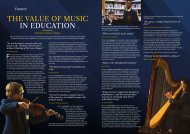Create successful ePaper yourself
Turn your PDF publications into a flip-book with our unique Google optimized e-Paper software.
58<br />
arbitrary exercise of power. It also enhanced<br />
the democracy and separation of<br />
powers in England as it took power away<br />
from the unelected monarch and required<br />
laws to be passed through<br />
Parliament instead. <strong>The</strong> idea of setting<br />
clear limits on power – favoured<br />
by Montesquieu particularly – was<br />
clearly influential here, but absolutely<br />
crucial to the American Founding<br />
Fathers (chiefly James Madison).<br />
<strong>The</strong> American War of Independence<br />
in the latter part of the 18 th Century,<br />
and the subsequent granting of the<br />
American Constitution in 1787, was<br />
hugely significant in establishing the<br />
rule of law, possibly being the most<br />
significant single event in this process.<br />
For example, under Article<br />
Two, it is established that the President<br />
and other senior officials can be<br />
impeached by Congress if their behaviour<br />
strays out of law, and under Article Three,<br />
the right to trial by jury was protected.<br />
Furthermore, the Bill of Rights (interestingly<br />
taking the same name as the aforementioned<br />
English bill) which was implemented<br />
in 1791, enshrined more aspects of<br />
the rule of law into the United States’ democracy.<br />
This was essentially just a group<br />
of ten amendments to the Constitution,<br />
that established intrinsic rights for every<br />
citizen of the USA, arguably being based<br />
of Cicero’s concept of Natural Law. For<br />
example, the<br />
“It was this age of Enlightenment,<br />
supported by philosophers such as<br />
Rousseau, which promulgated the<br />
notion of natural rights”<br />
Fifth<br />
Amendment<br />
protected the<br />
right to due<br />
process, and<br />
the Sixth established<br />
further<br />
rights for the accused, such as a speedy<br />
trial, the assistance of counsel, an impartial<br />
jury, and so on. Even regardless of the<br />
specific details, the American Constitution<br />
is particularly significant as it is one codified<br />
document, which sets out commitments<br />
to democracy, and to the rule of<br />
<strong>The</strong> US Constitution places a large emphasis on the ‘people’<br />
law. Also, as it was made “in one go”, unlike<br />
the evolutionary law in Britain, so the<br />
influence of philosophers on this document<br />
was significant. Montesquieu, who was<br />
interestingly also a judge, was the first to<br />
develop the principle of separation of<br />
powers, as mentioned above, which itself<br />
protects the citizens from arbitrary wielding<br />
of power and is one of the most defining<br />
principles of the US Constitution. This<br />
principle is so important that its implementation<br />
can be seen far more recently in<br />
order to “democratise” countries; after the<br />
Second World War, West Germany – under<br />
control of the allied powers – separated<br />
the judiciary and the legislature, as<br />
well as pursuing devolution<br />
of much legislative<br />
power to constituent<br />
states (Länder).<br />
Moreover, the US<br />
Constitution’s establishment<br />
of an elected<br />
legislature and executive<br />
(albeit by a tiny<br />
minority of the population), and clear<br />
term lengths for all officials, shows its rigorous<br />
commitment to democracy. <strong>The</strong>refore,<br />
the Constitution’s significance to<br />
both the rule of law and democracy was


















